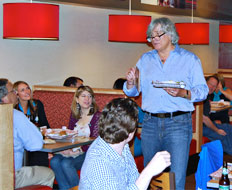Inside Smashburger’s newest Chicago-area restaurant, a hip-looking joint in the city’s trendy Lincoln Park neighborhood, company founder and chief concept officer Tom Ryan holds up the brand’s Windy City Burger as if it’s Lord Stanley’s Cup.
Packed with layers of melted Cheddar cheese, haystack onions, lettuce, tomato, and spicy mustard on a pretzel bun, the Windy City Burger is the fast-casual chain’s exclusive offering for the Chicago market and continues Smashburger’s six-year run of creating local burgers across its 209-store national footprint.
“This burger,” Ryan says, “represents the heartiness and boldness that is Chicago.”
In quick time, Ryan turns the floor over to his company’s newest partners from Chicago-based Goose Island, among the nation’s most celebrated breweries. Goose Island’s brewmaster, Brett Porter, and head of education, Suzanne Wolcott, detail how the toasty, caramel malt flavors in Goose Island’s Honker’s Ale complement the Windy City Burger.
The June 20 beer-and-burger pairing launched Smashburger’s 10th relationship with a craft brewer and helped spotlight craft brews’ continued emergence in the limited-service world.
Once reserved for bars and full-service restaurants, craft beers have pushed into fast-casual eateries around the country, available at spots such as Chipotle, Noodles & Company, and Shake Shack. For most craft brewers, growing entry into the quick-service world is a welcome trend that provides expanded market reach and diversification.
“Craft beer is a 30-year-old overnight success story, and there’s no turning back. Localization of the beer market is in every nook of the U.S.,” says Julia Herz, craft beer program director for the Brewers Association.
According to the Brewers Association, the craft category, which the Association defines as “small and independent” (wording that excludes the Anheuser-Busch InBev–owned Goose Island enterprise), captured 15 percent volume growth and 17 percent dollar growth in 2012. Craft brewing’s total sales share in 2012 was 6.5 percent by volume and 10.2 percent by dollars.
“This tells us there’s a growing segment of customers looking for craft beer and they’ll go where they can to get it and spend more at the places that offer it,” Herz says.
That surging momentum has motivated and inspired quick-service folks like Ryan to bring craft beer into the fold.
Over the last two years, Denver-based Smashburger has created local burger and craft-brew pairings in markets throughout the U.S., including partnerships with Summit Brewing in Minnesota’s Twin Cities, Christian Moerlein in Cincinnati, Sixpoint in New York City, New Belgium in Denver, and Deep Ellum in Dallas. Ryan teases future pairings in Las Vegas, San Francisco, and Sacramento, California.
“The idea is that once we have enough stores in a given market, we’ll pursue these partnerships and write the next chapter of our localization,” Ryan says. “We want to cater to local tastes as part of our brand mantra, and local craft beer is something people are gravitating toward.”
The partnerships, Ryan says, are also an effort to differentiate Smashburger in the ultra-competitive better-burger space. Same goes for the pairing suggestions from beverage and culinary experts, which are listed on the menuboard.
“I believe differentiation is the key to success in a highly competitive marketplace,” he says. “By tapping into craft brewing, one of the most energetic and innovative industries out there, we’re able to offer our guests something that is special, high quality, and distinctive.”
Though beer represents less than 4 percent of Smashburger’s total sales, Ryan expects the continued allure of craft beer to elevate that number. In fact, beer sales have jumped 20–50 percent in markets where Smashburger has introduced its craft-beer pairings.
Smashburger, which now has 11 Chicago-area stores, approached Goose Island about a potential partnership in mid-2012. Wolcott says Goose Island leadership appreciated Smashburger’s work to localize its menu and store environments, as well as the chain’s focus on quality.
“We’re a Chicago craft brewer that doesn’t take shortcuts, so we embraced what Smashburger was trying to do because it very much matches our work,” Wolcott says.
Over the course of nearly one year, Ryan, Porter, and Wolcott held numerous tastings to define which of Goose Island’s nearly 20 beers best complemented Smashburger’s signature entrées.
“The only challenge is to do this from an authentic perspective and commit the time to creating the pairings and rolling this out,” Ryan says. “Once in the restaurant, bottled beer isn’t hard to do.”
Ryan says the simultaneous innovation that has occurred in the burger and beer worlds affords his brand the opportunity to evolve America’s favorite food—the burger—and its favorite adult beverage for the next generation.
“With relationships like these, we can show people that burgers and beer are different than they used to be,” Ryan says.






